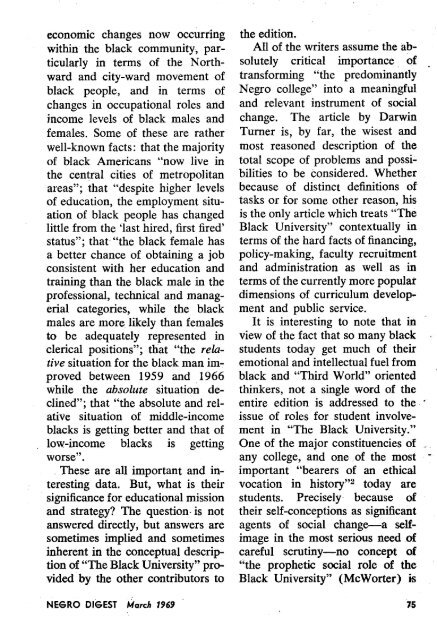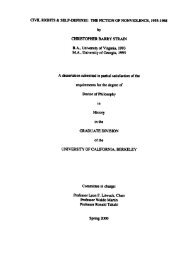Negro Digest - Freedom Archives
Negro Digest - Freedom Archives
Negro Digest - Freedom Archives
Create successful ePaper yourself
Turn your PDF publications into a flip-book with our unique Google optimized e-Paper software.
economic changes now occurring<br />
within the black community; particularly<br />
in terms of the Northward<br />
and city-ward movement of<br />
black people, and in terms of<br />
changes in occupational roles and<br />
income levels of black males and<br />
females . Some of these are rather<br />
well-known facts : that the majority<br />
of black Americans "now live in<br />
the central cities of metropolitan<br />
areas" ; that "despite higher levels<br />
of education, the employment situation<br />
of black people has changed<br />
little from the `last hired, first fired'<br />
status" ; that "the black female has<br />
a better chance of obtaining a job<br />
consistent with her education and<br />
training than the black male in the<br />
professional, technical and managerial<br />
categories, while the black<br />
males are more likely than females<br />
to be adequately represented in<br />
clerical positions" ; that "the relative<br />
situation for the black man improved<br />
between 1959 and 1966<br />
while the absolute situation declined"<br />
; that "the absolute and relative<br />
situation of middle-income<br />
blacks is getting better and that of<br />
low-income<br />
worse" .<br />
blacks is getting<br />
These are all important and interesting<br />
data. But, what is their<br />
significance for educational mission<br />
and strategy? The question- is not<br />
answered directly, but answers are<br />
sometimes implied and sometimes<br />
inherent in the conceptual description<br />
of "The Black University" provided<br />
by the other contributors to<br />
NEGRO DIGEST Match 7969<br />
the edition .<br />
All of the writers assume the absolutely<br />
critical importance . of<br />
transforming "the predominantly<br />
<strong>Negro</strong> college" into a meaningful<br />
and relevant instrument of social<br />
change . The article by Darwin<br />
Turner is, by far, the wisest and<br />
most reasoned description of the<br />
total scope of problems and postbilities<br />
to be considered . Whether<br />
because of distinct definitions of<br />
tasks or for some other reason, his<br />
is the only article which treats "The<br />
Black University" contextually in<br />
terms of the hard facts of financing,<br />
policy-making, faculty recruitment<br />
and administration as well as in<br />
terms of the currently more popular<br />
dimensions of curriculum development<br />
and public service .<br />
It is interesting to note that in<br />
view of the fact that so many black<br />
students today get much of their<br />
emotional and intellectual fuel from<br />
black and "Third World" oriented<br />
thinkers, not a single word of the<br />
entire edition is addressed to the<br />
issue of roles for student involvement<br />
in "The Black University ."<br />
One of the major constituencies of<br />
any college, and one of the most<br />
important "hearers of an ethical<br />
vocation in history" 2 today are<br />
students . Precisely because of<br />
their self-conceptions as significant<br />
agents of social change-a selfimage<br />
in the most serious need of<br />
careful scrutiny-no concept of<br />
"the prophetic social role of the<br />
Black University" (McWorter) is<br />
l5
















